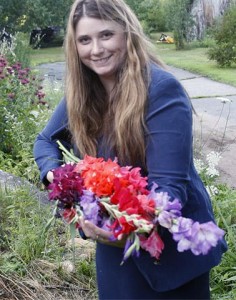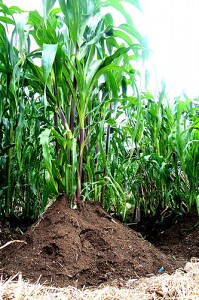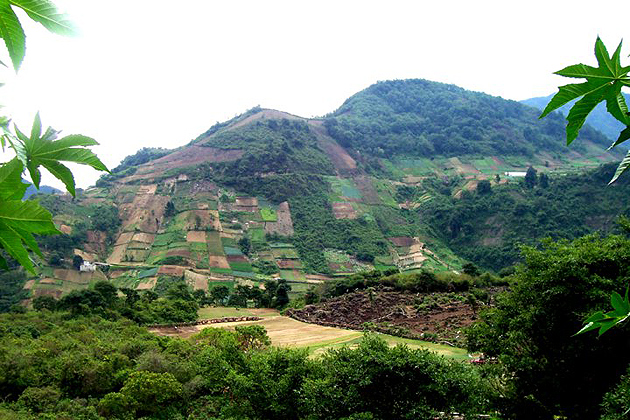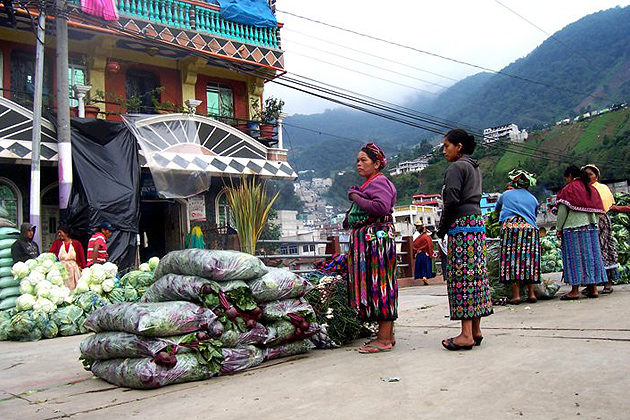
Climate change in Guatemala is making an already difficult existence even more so for people who struggle to make a living in rugged terrain thousands of feet above sea level. Rachel Shenyo, a master’s degree candidate in the Department of Agricultural and Resource Economics, has personally witnessed the change, and she has plans to do something about it.
When she was a Peace Corps volunteer in Guatemala from 2002 to 2004, Shenyo quickly grew to admire the resourcefulness of the indigenous people with whom she worked. With an undergraduate degree in animal science, she provided de facto veterinary service to local farmers in remote villages and watched as they cultivated their crops on small parcels of land in the rural highlands. She also started a USDA grant-funded initiative to help improve income from sheep production, a project she worked on for seven years prior to coming to UConn.
Now, as a student working under the guidance of her advisor, Professor Boris Bravo-Ureta in the College of Agriculture and Natural Resources, she has made several trips back to this Central American country in an effort to explore how residents view climate change and what adjustments they have made in their farming practices.

“I’ve been working with a government agency and we’ve looked at 40 years of climate data,” she says, “and one of the things we’ve noticed is that wind directions have changed. Historically we’ve documented that Guatemala was rarely hit by hurricane winds, maybe a couple of direct hits in 100 years, but in the last seven years they’ve been battered by six major tropical systems. Last October, they had five feet of rain in 10 days.
“What’s happening in this fragile, mountainous environment,” Shenyo continues, “is that the infrastructure is becoming completely overwhelmed. We’re finding that not only is the climate changing, it’s changing with the altitude. This means that crops are affected in different ways and that growing conditions are dramatically different from farm to farm, depending on the altitude where it is located.”
Shenyo was a Tinker Grant recipient in the summer of 2011, and she used her stipend to travel to the Central American country she had first gotten to know during her stint in the Peace Corps. She returned in January 2012 and conducted 130 field interviews with families in eight different villages at eight different altitudes.
“We’re trying to find out how residents perceive what’s happening to their environment and how they’re being impacted. We discovered [in preliminary analysis] that every three years, most families are experiencing between 30 per cent and 100 per cent crop loss,” she says. “These are some of the poorest people in the Western Hemisphere and we’re trying to determine if economic models can be used in conjunction with scientific models to suggest some sort of adaptation strategy. We want to reduce the vulnerability [to climate change] and increase the area’s ability to respond.”

Even if an individual farmer isn’t focusing on larger economic issues, Shenyo points to the importance of letting governmental policy makers know what’s happening in the ‘real world.’ “We realize that economic analysis may not help farmers in this growing season or the next, but by making the government aware of potential long-term goals we can make progress,” she says. “One of the things we’re focusing on is how crops are grown. In this part of the world we see a lot of monoculture … one crop or one variety of a crop grown in large quantities. We think that introducing a polyculture, where different varieties are grown, may be the way to go. If 30 percent of the time you expect floods in a certain area, let’s try to find flood-resistant varieties of corn; let’s plant 30 percent of your crop with that [variety], because it will produce no matter what.”
Bravo-Ureta is impressed with Shenyo’s determination to make a difference. He says, “Rachael is down to earth and she knows what she wants to do. She’s someone who wants to be involved at the grass-roots level and she has an appreciation of the indigenous people in Guatemala; they may be poor but they’re survivors and that ‘can do’ attitude appeals to her.”

The U.S. State Department recently awarded a grant for $480,000 to UConn’s Global Training and Development Institute to develop a Women’s Empowerment Program – a two-way Professional Fellows exchange program in partnership with the University for Peace in Costa Rica. The program is designed to address issues such as economic development, environmental sustainability, and family health, and Shenyo has been chosen to represent the U.S. as a Fellow. She will travel to Costa Rica in August, where she will share her knowledge of sustainability issues with women who share her concern for the environment.
Once she completes her degree, probably sometime this summer, Shenyo plans to return to Guatemala, where she hopes to develop an NGO that will coordinate the many diverse efforts already in place.
“Currently,” she says, “there are localized pockets of expertise with some people studying weather patterns and some studying agriculture and some studying cultural norms, but unfortunately these efforts are not coordinated, and important messages are not getting through to the governmental policy-makers who could make a difference if they understood the whole picture.”
She envisions establishing an agency that is part research, part education, and part outreach, in an effort to assure sound land use decision-making that will benefit a people who won her admiration when she first met them as a Peace Corps volunteer a decade ago.



